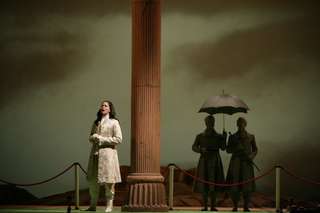|
Back
HGO Season Closes with Vocal Fireworks Houston
Brown Theater, Wortham Center
04/30/2010 - & May 2, 4, 12, 14, 2010
George Frideric Handel: Xerxes
Susan Graham (Xerxes), Laura Claycomb (Romilda), David Daniels (Arsamenes), Sonia Prina (Amastre), Heidi Stober (Atalanta), Philip Cutlip (Ariodate), Adam Cioffari (Elviro)
Houston Grand Opera Orchestra and Children’s Chorus, Richard Bado (chorus master), William Lacey (conductor)
Nicholas Hytner (original director), Michael Walling (revival director), David Fielding (set and costume designer), Paul Pyant (lighting designer), Priscilla Nathan Murphy (choreographer)

S. Graham (© Felix Sanchez)
The 2009-10 Houston Grand Opera season closes with a thoroughly enjoyable performance of Handel’s Xerxes. A superb cast led by three of the finest Handel singers working today complements an engagingly stylized visual production, and William Lacey and the orchestra support with elegance and precision.
HGO General Director Anthony Freud announced before the curtain that Susan Graham had taken ill, but would still sing, mildly upsetting many in the audience. Graham’s singing removed any doubt, and her voice was the jewel in the superb cast’s crown. From an exquisite "Ombra mai fù” to a stunningly articulated and vigorous “Crude furie degl’orridi abissi”, hers was the epitome of Baroque vocal technique. Her rich tone and impeccable trills, coloratura and diction were consistent throughout a lengthy, demanding role.
Laura Claycomb’s Romilda got off to a bit of a slow start. Singing slightly behind the orchestra’s pulse throughout the first act, she and Lacey became increasingly more in phase through the second and third acts. David Daniels’ excellent singing made one wish Arsamenes had more arias. The two sang beautifully in “Troppo'l Traggi”, their voices blending wonderfully and their chemistry wholly believable.
Heidi Stober, an HGO studio alumnus heard here in her most substantial role yet, sang and acted Atalanta with the confidence and vocal acumen of a veteran. She stole every scene and deliciously manipulated the audience from loving her to hating her and back again. Sonia Prina has a slight hard edge to her voice, and this brought an exciting and effective contrast to Amastre. She tumbled excitingly through her virtuoso arias with her athletic singing, and she convinced as Xerxes’ spurned lover, never sugarcoating her lyrical moments but singing them with latent bitterness. Philip Cutlip also sang well, particularly fine in Act 3’s “Del Ciel d´amore”.
The challenge of Xerxes is making a lengthy opera with a rather silly plot engage the audience, and Michael Walling succeeded. The multi-layered visual production, with the chorus moving on a different timeline from the soloists and adorned in stodgy monochromes, provided ample contrast to keep the eyes engaged. The acting of the chorus, constantly irritated by the petty complications in the soloists’ lives, was subtly comic and contrasted nicely with Adam Ciaffiro’s slapstick Elviro, especially enjoyable in the opening of Act 2. Likewise, William Lacey capitalized on the potential variety for instrumental color in Handel’s score, accompanying many of the recitatives himself and tastefully differentiating continuo scoring throughout the opera, with deliciously emphasized theorbo and baroque guitar timbres. The chorus and orchestra adopted Baroque performance practices adeptly, paring back vibrato but not sacrificing beauty or blend of tone.
Marcus Karl Maroney
|